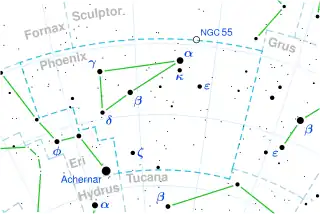Delta Phoenicis
Delta Phoenicis, Latinized from δ Phoenicis, is a single,[9] yellow-hued star in the southern constellation of Phoenix. With an apparent visual magnitude of 3.93,[2] it is visible to the naked eye. Based upon an annual parallax shift of 22.95 mas as seen from Earth,[1] it is located 142 light years from the Sun. The star is moving closer to the Sun with a radial velocity of −7 km/s.[4]
 | |
| Observation data Epoch J2000 Equinox J2000 | |
|---|---|
| Constellation | Phoenix |
| Right ascension | 01h 31m 15.10475s[1] |
| Declination | −49° 04′ 21.7308″[1] |
| Apparent magnitude (V) | 3.93[2] |
| Characteristics | |
| Spectral type | G8.5 IIIb[2] |
| U−B color index | +0.70[3] |
| B−V color index | +0.99[3] |
| Astrometry | |
| Radial velocity (Rv) | −7.3±0.7[4] km/s |
| Proper motion (μ) | RA: +138.38[1] mas/yr Dec.: +153.89[1] mas/yr |
| Parallax (π) | 22.95 ± 0.19 mas[1] |
| Distance | 142 ± 1 ly (43.6 ± 0.4 pc) |
| Absolute magnitude (MV) | 0.73[2] |
| Details | |
| Mass | 1.46[5] M☉ |
| Radius | 10.5[6] R☉ |
| Luminosity | 60.14[2] L☉ |
| Surface gravity (log g) | 2.61[7] cgs |
| Temperature | 4,762±26[5] K |
| Metallicity [Fe/H] | -0.28[7] dex |
| Rotational velocity (v sin i) | < 1.0[8] km/s |
| Age | 3.69[5] Gyr |
| Other designations | |
| Database references | |
| SIMBAD | data |
This is a G-type giant star with a stellar classification of G8.5 IIIb.[2] It is a red clump star, which means it has reached the stage of its evolution where it is generating energy through helium fusion at its core.[7] The measured angular diameter of this star, after correction for limb darkening, is 2.24±0.02 mas.[10] At its estimated distance, this yields a physical size of about 10.5 times the radius of the Sun.[6] It is around 3.7[5] billion years old with 1.46[5] times the mass of the Sun. The star is radiating 60[2] times the Sun's luminosity from its enlarged photosphere at an effective temperature of 4,762 K.[5]
References
- Van Leeuwen, F. (2007). "Validation of the new Hipparcos reduction". Astronomy and Astrophysics. 474 (2): 653–664. arXiv:0708.1752. Bibcode:2007A&A...474..653V. doi:10.1051/0004-6361:20078357. S2CID 18759600. Vizier catalog entry
- Anderson, E.; Francis, Ch. (2012). "XHIP: An extended hipparcos compilation". Astronomy Letters. 38 (5): 331. arXiv:1108.4971. Bibcode:2012AstL...38..331A. doi:10.1134/S1063773712050015. S2CID 119257644. Vizier catalog entry
- Mallama, A. (2014). "Sloan Magnitudes for the Brightest Stars". The Journal of the American Association of Variable Star Observers. 42 (2): 443. Bibcode:2014JAVSO..42..443M.Vizier catalog entry
- Gontcharov, G. A. (2006). "Pulkovo Compilation of Radial Velocities for 35 495 Hipparcos stars in a common system". Astronomy Letters. 32 (11): 759–771. arXiv:1606.08053. Bibcode:2006AstL...32..759G. doi:10.1134/S1063773706110065. S2CID 119231169.
- Luck, R. Earle (2015). "Abundances in the Local Region. I. G and K Giants". Astronomical Journal. 150 (3). 88. arXiv:1507.01466. Bibcode:2015AJ....150...88L. doi:10.1088/0004-6256/150/3/88. S2CID 118505114.
- Lang, Kenneth R. (2006), Astrophysical formulae, Astronomy and astrophysics library, vol. 1 (3rd ed.), Birkhäuser, ISBN 978-3-540-29692-8. The radius (R*) is given by:
- Liu, Y. J.; Zhao, G.; Shi, J. R.; Pietrzynski, G.; Gieren, W. (2007). "The abundances of nearby red clump giants". Monthly Notices of the Royal Astronomical Society. 382 (2): 553. Bibcode:2007MNRAS.382..553L. doi:10.1111/j.1365-2966.2007.11852.x.
- De Medeiros, J. R.; Alves, S.; Udry, S.; Andersen, J.; Nordström, B.; Mayor, M. (2014). "A catalog of rotational and radial velocities for evolved stars". Astronomy & Astrophysics. 561: A126. arXiv:1312.3474. Bibcode:2014A&A...561A.126D. doi:10.1051/0004-6361/201220762. S2CID 54046583. Vizier catalog entry
- Eggleton, P. P.; Tokovinin, A. A. (September 2008). "A catalogue of multiplicity among bright stellar systems". Monthly Notices of the Royal Astronomical Society. 389 (2): 869–879. arXiv:0806.2878. Bibcode:2008MNRAS.389..869E. doi:10.1111/j.1365-2966.2008.13596.x. S2CID 14878976.
- Richichi, A.; Percheron, I.; Khristoforova, M. (February 2005), "CHARM2: An updated Catalog of High Angular Resolution Measurements", Astronomy and Astrophysics, 431 (2): 773–777, Bibcode:2005A&A...431..773R, doi:10.1051/0004-6361:20042039.